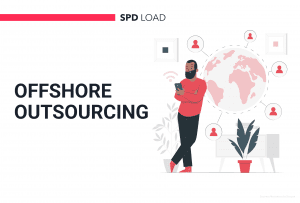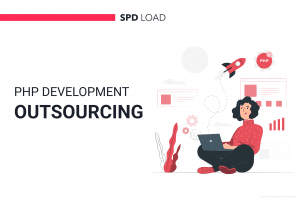Should a Startup Outsource Its Software Development in 2025?
- Updated: Oct 21, 2024
- 13 min
Software development outsourcing has been around for a while, and the market is only growing.
In fact, the IT offshoring market size has reached $617.69 billion in 2025 and is expected to reach $806.53 billion by 2029.
All big and super successful companies were startups once.
Alibaba, Airbnb, Slack, and Amazon have all started off as startups.
They also have one thing in common. At some stage of their journey, they all outsourced software development to focus on their core business activities and keep steady growth.
Many continue to use external providers.
According to IGS, 92% of G2000 companies are using IT outsourcing.
So, is outsourcing software development for startups a good solution?
As a software development company with over a decade of successful partnerships with startups, we know the answer.
All big companies have started somewhere.
Even though it is possible to do it all with a small team only, businesses still turn to third-party services.
Outsourcing startup development is a smart solution to turn your startup idea into reality faster and with lower risks.
Successful apps are often the result of strong partnerships with reliable MVP development companies. Learn how to build one in our article on app development partnerships.
Let’s discuss software development outsourcing for startups further.
Explore our SaaS services today
Why Do Startups Outsource Software Development?
There are many reasons why startups outsource software development.
First is the one we face the most often: time constraints.
The success of most, if not all, startups in 2025 depends on how fast they are able to deliver value to their customers.
That is why founders reach out to external experts.
Outsourcing companies help quickly deliver the product and meet the deadlines without compromising on quality.
Another reason is that often, startups need funding to develop their software solutions.
To get that funding, they need to showcase that their team is professional enough to deliver a high-quality product.
By partnering with an IT outsourcing services provider, a startup can showcase that the team is capable of performing the tasks on time and meeting the investors’ expectations.
Additionally, startups should always stay budget-conscious.
With limited costs, it might be hard to hire top specialists in-house.
And teaching them from scratch is both time and cost-consuming.
Outsourcing gives you access to the global talent pool.
Hiring developers from Ukraine, for example, is cheaper than paying the same specialists from the UK or the US.
So, wrapping up, startups outsource the software development process because they need to launch quickly, attract investors, and get specialized skills while having a limited budget.
But is outsourcing software development for startups always a good idea?
Let’s see. 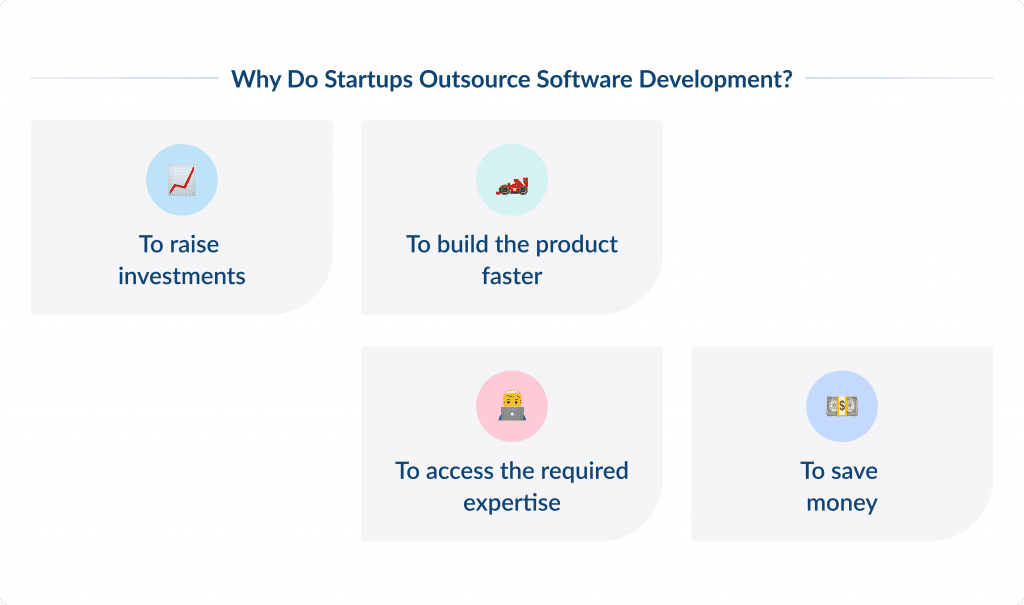
When Outsourcing is Good for a Startup?
From cost savings to better service, the benefits of fintech are transforming industries.
Let’s say your startup has a great idea for a new fintech app.
You’ve got a strong team of business strategists and product designers, and you did your market research, but there is no one experienced in coding.
Instead of spending months trying to hire in-house developers, you outsource the development to an external team that specializes in fintech software.
Here’s how outsourcing helps you in this case:
- Faster development: the outsourced team already has experience in fintech app development, so they can build your product much faster than if you had to hire and onboard a new team from scratch.
- Access specialized skills: the external team knows all the latest tech stacks and best practices. They are all in, helping you avoid rookie mistakes and ensuring your app is built to scale. Discover how to choose a tech stack with our expert advice.
- Focus on core business strategies: while the developers work on the software, you and your team can focus on user acquisition, partnerships, and marketing — all critical tasks for a startup. In this situation, outsourcing software development accelerates your progress without distracting your core team from business growth.
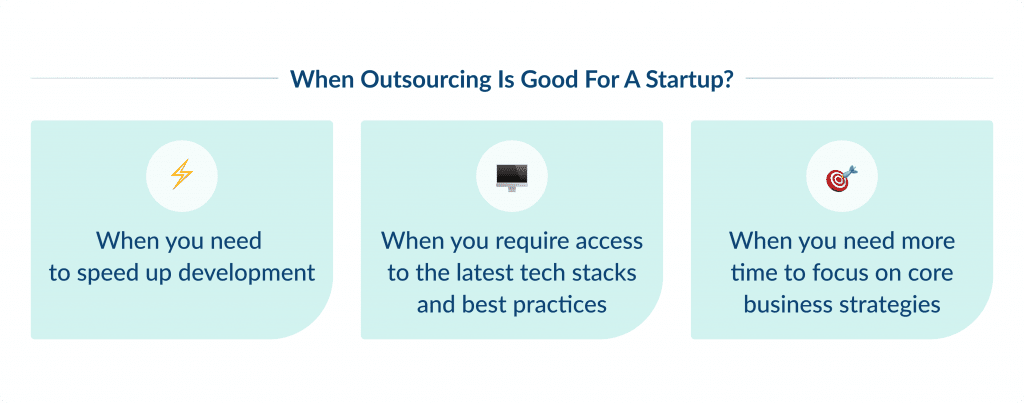
When Outsourcing is Bad for a Startup?
Now, imagine your startup decides to outsource its entire app development process, including product management, to an external agency.
You hand over your idea and step back, assuming the outsourced team will figure everything out.
Here’s where problems arise:
- Lack of control: The software development company doesn’t fully understand your vision. Because you’re not closely involved in the process, they make decisions that don’t align with your goals. The development process has started, but the product that comes out doesn’t feel right.
- Slow communication: Every time there’s a change or question, it takes days to get a response because of time zone differences and long email chains. It slows down the software development. To improve your email marketing game, check out these email marketing for startups strategies and tips.
- No ownership: Since the software development company is not part of your core team, they might not be as invested in your startup’s success.They’ll do the work but won’t go above and beyond to innovate or optimize.
In this case, outsourcing becomes a problem because you lose control over the product. This leads to misaligned development and delays.
So, outsourcing software development works best when you stay closely involved, retain control over product decisions, and ensure clear communication with your external team. 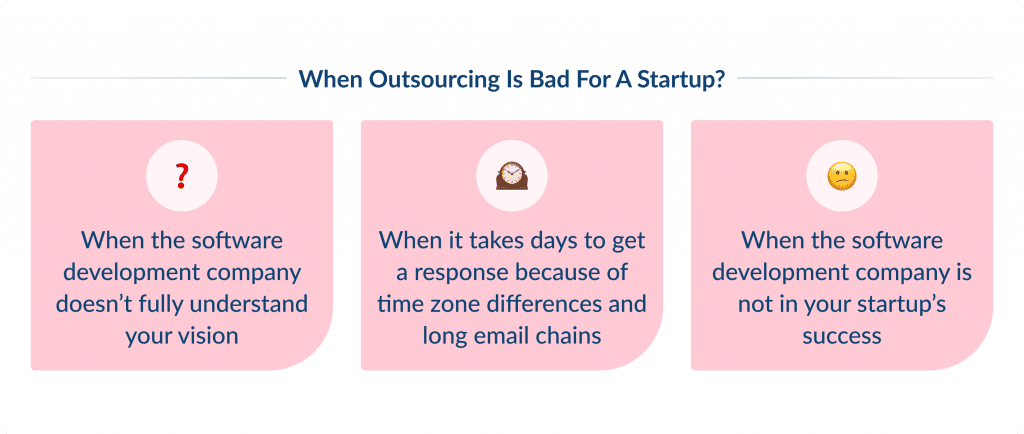
Startup Challenges and How Outsourcing Can Solve Them
Depending on your startup funding type, you may face various challenges when it comes to development.
Here is how outsourcing software development can be helpful:
1. Bootstrap or Seed-Funded Startup Challenges
You’ve just started your company, and you’re trying to build your product with only a small budget.
You might not have enough money to hire a full team, and maybe you don’t have the technical skills to code the product yourself.
That’s where outsourcing can be a real lifesaver.
If you hire a development team from outside, especially from regions where labor costs are lower, you can save on development without sacrificing quality.
Hence, you’re able to get experienced developers working on your project without draining your limited funds.
Another issue is time.
As a founder, you’re probably juggling many responsibilities.
You can outsource the technical side of things to experts and focus on other critical areas like finding customers or pitching to investors.
2. Angel Investor Funded Startup Challenges
Let’s say you’ve raised some money from an angel investor, and now you’re under pressure to show results quickly.
You need to build your product fast, but also make sure it’s good enough to attract more investors or customers.
However, you still might not have the budget to hire a complete in-house team.
Startups outsource software development to move quickly because you can work with a team that knows what they’re doing right from the start.
As you start to get feedback from users, you may need to tweak your product or even make significant changes.
Having an external development team can make this easier. They can adjust quickly based on your needs, and you don’t have to go through the lengthy process of hiring and training new people.
This flexibility can be a huge advantage in the early days when things are constantly changing.
Find out how long it really takes to develop an app with our comprehensive guide on how long it takes to develop an app.
3. Venture Capital Financing Startup Challenges
Now, imagine your startup has attracted venture capital.
You’ve got funding, but the expectations are high.
You’re being pushed to grow fast — add new features, increase your user base, and maybe even expand into new markets.
The challenge is that you need to scale quickly, but hiring developers can be slow and competitive.
Outsourcing solves this by giving you access to a larger pool of developers who can jump in and help build your product immediately.
You might also be dealing with more complex technical challenges as your app or platform grows.
For example, maybe you need expertise in artificial intelligence or cloud infrastructure, areas where your in-house team lacks experience (here’s everything you need to know about in-house development vs. outsourcing.)
Explore the advantages of cloud-based app development to improve app performance and accessibility.
Instead of struggling with these problems, you can outsource these specialized tasks to experts who can handle them efficiently.
This helps you keep up with the pace your investors expect without putting your company under unnecessary stress.
4. Mature Startup Challenges
Now, picture your startup a few years down the road.
You’ve grown your user base and built a solid product, but maintaining that growth is challenging.
One issue that often comes up is staying innovative.
As the team gets larger, it’s easy to lose the fast-paced creativity you had in the early days.
Outsourcing can bring fresh ideas and new approaches, keeping your product competitive.
On top of that, your user base is expanding, and your technology needs to keep up.
If your product crashes under heavy use, it can hurt your reputation.
Outsourcing the technical side of scaling your infrastructure can help you avoid these problems.
An experienced external team can make sure your product runs smoothly as it grows.
If you’re planning to expand into new markets, outsourcing can also help here.
Let’s say you want to launch your app in another country. You can work with local software development companies that understand the language, culture, and regulations, which makes the process faster and more efficient.
In each of these scenarios, outsourcing can help you overcome the specific challenges you face at different stages of growth.
It’s a way to bring in expertise, save time, and keep your startup moving forward without getting bogged down in the details.
Check out our guide on startup funding where we've gathered everything you need to know for successful fundraising
5 Steps to Outsource Software Development
Startup software development outsourcing is a serious step, and there are many things you need to consider before dedicating your development and business processes to a third-party vendor.
Here are 5 steps to outsourcing software development for startups:
Step 1: Get Clear on Your Idea
Before you bring in anyone to help, you need to know exactly what you’re building.
Think about it like this: if you were explaining your idea to a friend, how would you describe it?
You want to get specific about what your product will do, who will use it, and which features are essential.
This helps you explain the project to an outsourced software development team clearly and avoids confusion later on.
For example, if you’re building an app to help people stay fit, write down things like “users should be able to log their workouts, track their progress, and set fitness goals.”
The more detailed you are, the easier it will be for the developers to bring your idea to life.
Dreaming of creating a unicorn? Here’s how to find an idea for a unicorn startup.
Step 2: Find the Right Team
Once you know what you need, it’s time to look for the right people to build it.
You can either hire a full development agency or freelance developers.
To find the right fit, think about your specific needs.
Do they have experience in the kind of app you want to create?
Check their past projects, ask for client feedback, and make sure they understand your industry.
In this guide, we have dived deeper into how to find a remote dedicated development team.
For instance, if you’re building a healthcare app, it’s smart to find a team that has experience in healthcare software.
They’ll know about things like data privacy laws, which are crucial in that field.
Discover the best healthcare startups making a significant impact in the industry.
Step 3: Set Expectations from Day One
Once you’ve found your team, have an honest conversation about timelines, costs, project scope, and how you’ll stay in touch.
A good tip is to break the project down into smaller chunks or milestones so you can check in on progress regularly.
This way, you won’t get any big surprises at the end of the project.
You might agree to get a minimum viable product version in two months.
The functionality might include a working login system and user profiles.
Step 4: Stay Involved and Give Feedback
Outsourcing doesn’t mean you can hand off your project and disappear.
It’s still your idea, so you need to stay involved and provide feedback.
When the developers send you progress updates, test out the product and let them know what’s working or what needs tweaking.
Open, honest communication is key to making sure your vision becomes a reality.
If the app doesn’t look or feel quite right during testing, let the team know.
The earlier you catch issues, the easier and faster they are to fix.
Step 5: Test and Go Live
Once the project is nearing completion, it’s time to test the product carefully.
Try to use it like your customers would, and invite others to do the same.
Testing helps catch any last-minute issues before you launch.
After you’re confident everything is working smoothly, you’re ready to release your product!
Even after launching, it’s a good idea to have the development team on standby to fix any bugs or make quick updates as needed.
With these simple steps, outsourcing doesn’t have to be overwhelming.
Try to keep things clear, stay involved, and work closely with the team to bring your idea to life.
Check out these five usability testing ways that will help elevate your startup’s performance. 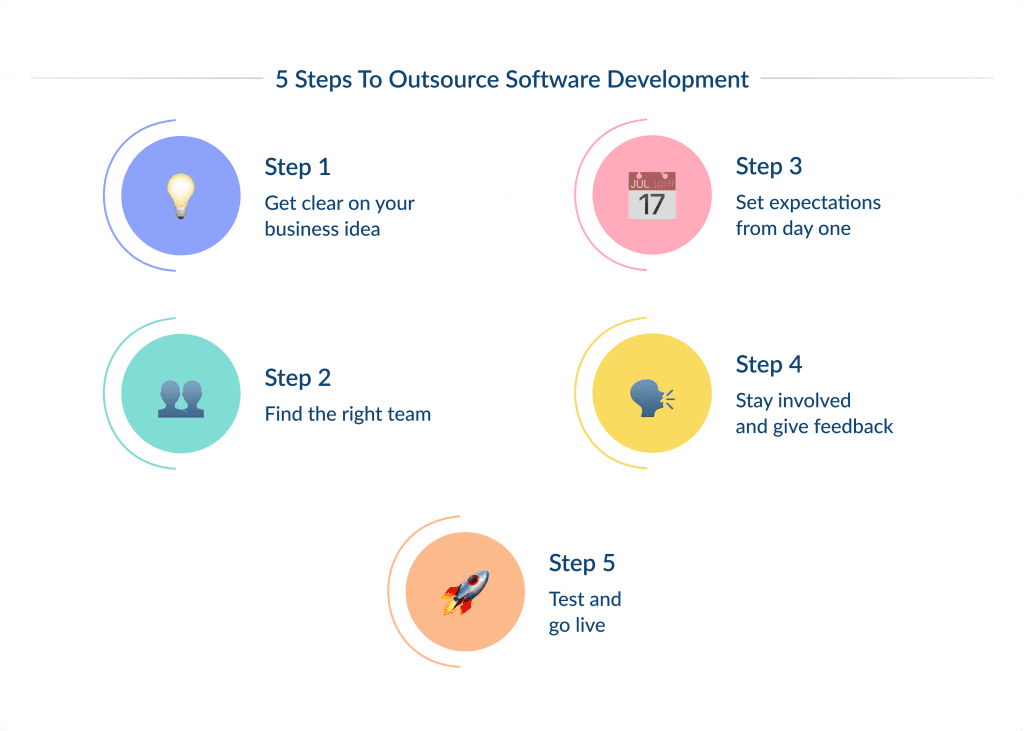
Software Outsourcing Risks and How to Mitigate Them
Despite the fact that almost over 60% of companies are satisfied with outsourced services, there is still a large number of those who were dissatisfied with outsourcing. 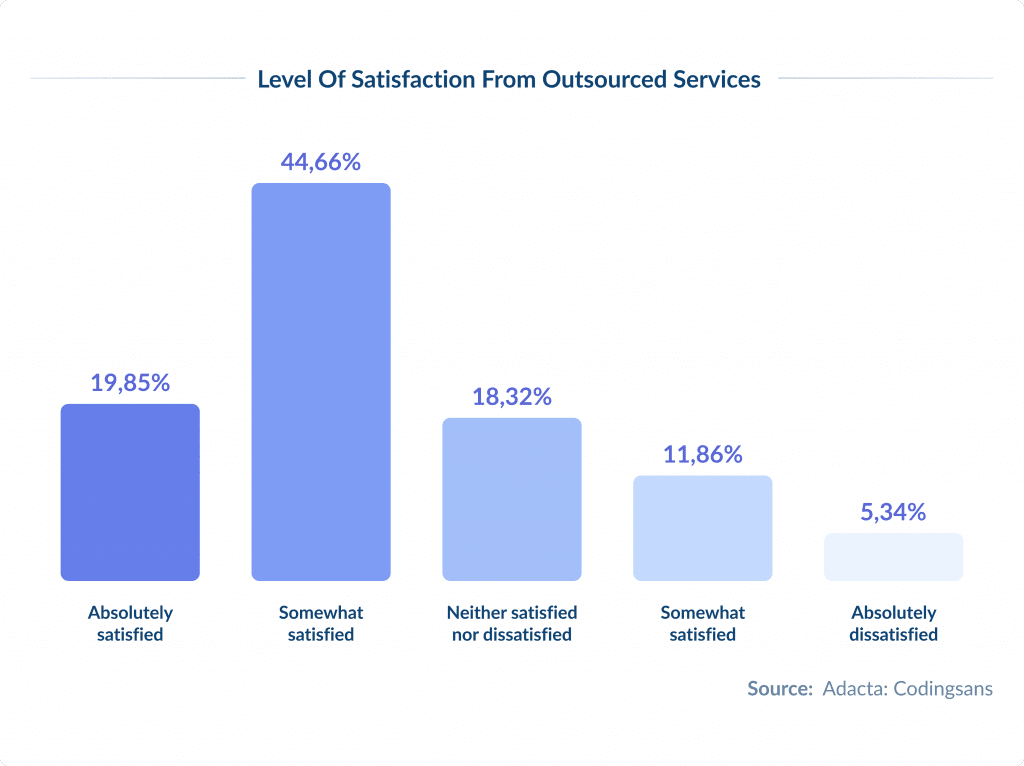
The dissatisfaction may have multiple reasons but to avoid, or at least eliminate them, you want to be aware of certain risks that come with outsourcing software development for startups.
The most common ones are difficulties in finding reliable partners, loss of project control, sensitive data safety, and hidden costs.
Let’s explore these risks in more detail and see how you can mitigate them.
Making the Right Choice with the Vendor
Choosing the right outsourcing company to outsource software development is the biggest problem for both mature companies and startups.
But if you make the right choice, the chances of other development outsourcing risks are zero.
With a good outsourced software development company nearby, you can be sure your development team will have the skills, your project will be delivered on time and bug-free, data will be safe, and collaboration will be transparent and efficient.
How do you find a reliable vendor for your software projects?
Feel free to explore the step-by-step in our guide on IT Outsourcing for Small Business.
There, we have covered everything about how to find a reliable partner + a checklist for IT outsourcing.
Project Control
Another concern our clients have when just starting to work with us is the loss of control over the project.
That fear is understandable, and our goal at SpdLoad is to make sure that you don’t feel out of context when it comes to the project management and development.
Before the collaboration starts, we discuss communication and reporting practices with our clients in advance.
What’s more, we encourage project owners to be engaged in the development process, communicate with the Project Manager and the team directly, and frequently share their feedback.
This way, we make sure that we are always on the same page.
For efficient task handling, here are the best project management software options available today.
Sensitive Data Safety
When you outsource software development, you also have to share insider information about your business and discuss innovative ideas with your development vendor.
This might feel risky.
To protect your sensitive data and business reputation, we sign a Non-Disclosure Agreement (NDA) before the first consultation.
This doesn’t mean that you don’t trust your potential outsourcing partner; you just protect your business idea. We encourage everyone to sign an NDA before the collaboration is launched.
Hidden Costs
Hidden costs are another concern many startups have when deciding whether or not they should reach out to external vendors.
To avoid this risk, you want to make sure to carefully choose your engagement model and the corresponding type of contract (we will overview them further).
Ask for precise estimates, and agree on reporting and billing approaches in advance. 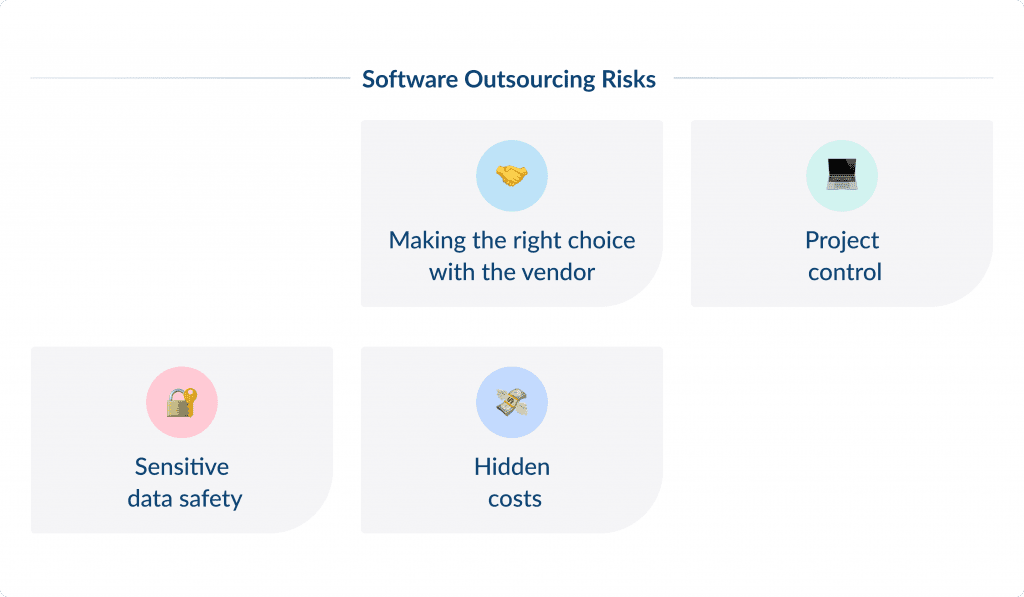
Software Outsourcing Costs and Pricing Models
Outsourcing software development is often a cost-effective solution for a startup.
However, the pricing may vary depending on multiple factors like team location, expertise you need, team size, industry, functionality, and more.
Here is an example of software development cost by country where your development team is located: 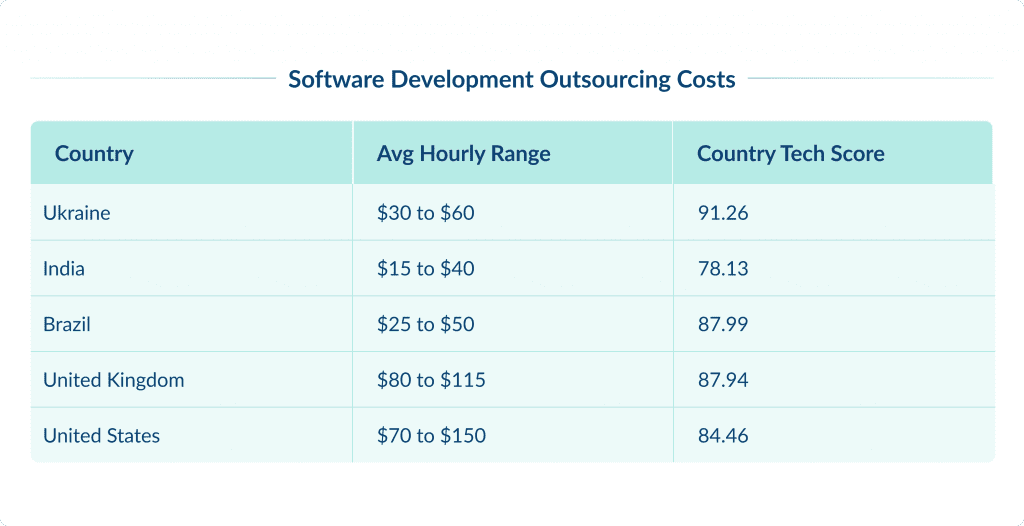
Learn more about software development outsourcing costs in our guide.
Time and Material Contract
When working under a time and material contract, you are paying only for the actual time and materials used in software development.
This model offers flexibility to make changes and adjustments as needed.
This collaboration model is suitable for projects with uncertain or changing requirements.
However, be aware of the risk of cost overruns and scope creep.
Fixed Price Contract
In fixed price contracts, outsourcing companies charge a set price for a specific scope of work.
This model is suitable for projects with well-defined requirements and timelines.
However, it can be hard to predict if there will be any changes in project requirements. That makes this model not very attractive.
Dedicated Team Model
When choosing a dedicated team model, you are working with a dedicated team of developers and project managers.
This type of collaboration is suitable for long-term projects and partnerships.
Tech startups often choose this model as it helps them build a strong working relationship and trust. 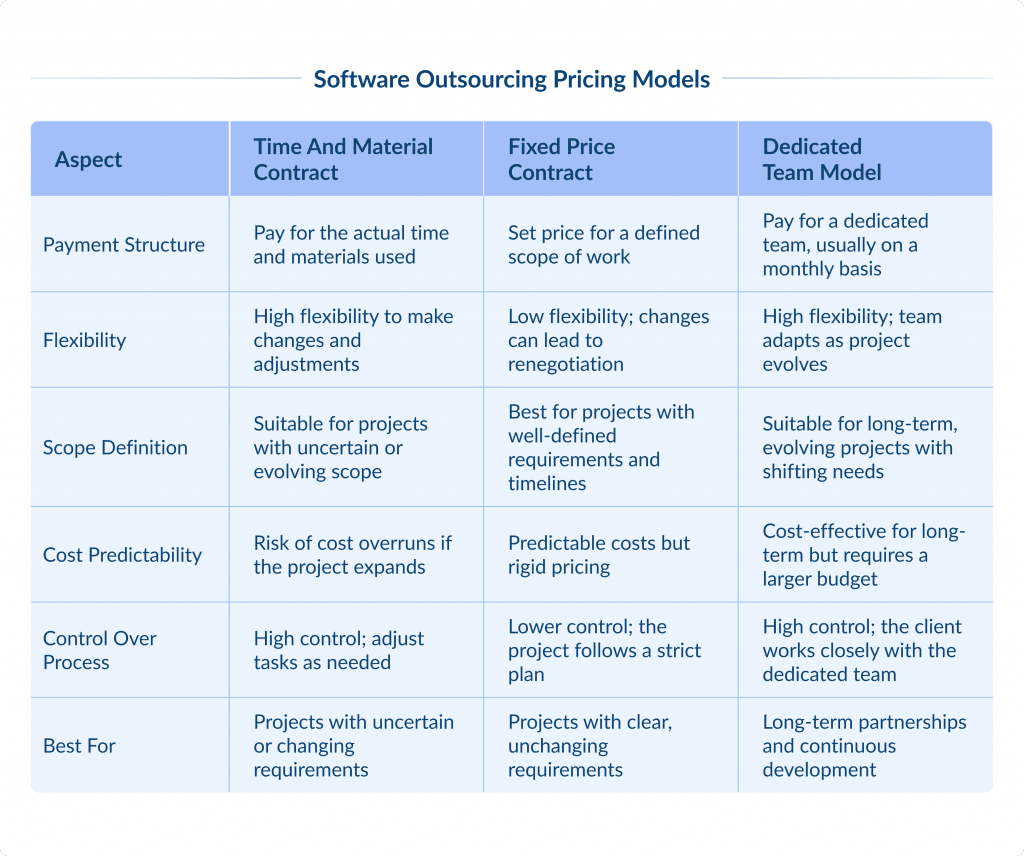
Want to build a strong founding team? Start by learning how to find a technical co-founder.
Outsourcing Software Development for Startups: Worth It or Not?
In the tech industry, when timing and fast execution are everything, outsourcing software development can be a viable option for startups.
Most successful companies outsource software development and IT tasks to save time and access product development expertise, technical expertise, and other skills they lack.
Additionally, software development outsourcing can potentially save costs when choosing from countries with lower rates.
However, outsourcing software development services comes with its risks.
The most common concerns are related to loss of control, fear of getting your idea stolen, potential hidden costs, and sensitive data safety.
To eliminate those risks, you need to build your own outsourcing strategy.
Establish clear goals and objectives, transparently communicate your ideas, and provide regular feedback to make sure you and the outsourcing company you work with are aligned.
Answering the question on the heading, we would say that it is definitely worth it to outsource software development as a startup.
You will get the expertise you need, speed up the development process, and still have time for your core business activities.
But you still need to dedicate some time to selecting a reliable development partner.
There are over 21,500 software development companies in the world. So, how do you choose the right one?
Even a short 15-minute call with potential outsourcing partners will be enough to determine whether you will be a match or not.
Feel free to contact us, and we will book a brief call to discuss your business idea and see if our custom software development services can help you reach your goals.
Building a startup is challenging but rewarding. This guide shows how to start a startup from scratch.
Looking for inspiration? Here are the best SaaS startup ideas making waves in the market.




